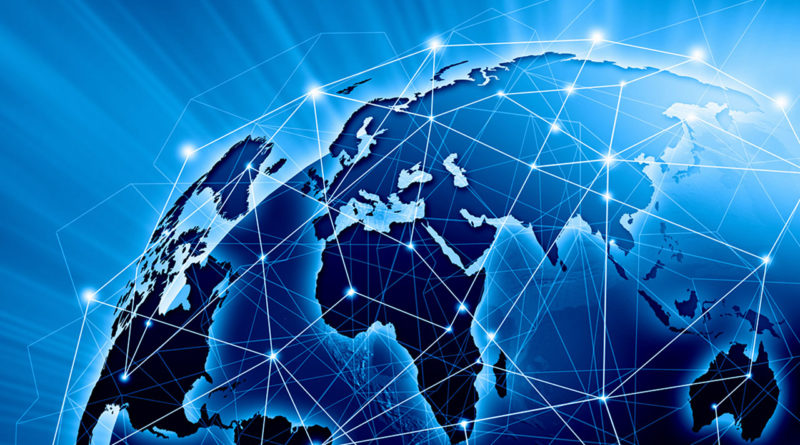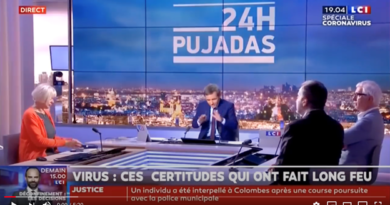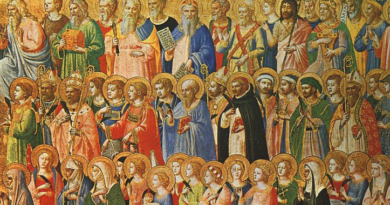Multipolarity and open society: geopolitical realism versus cosmopolitical utopia. Pluriversum vs universum.
“Let us imagine, in the future, a universal state encompassing all of humanity. In theory, there would no longer be an army, but only a police force. If a province or party took up arms, the single, global state would declare them rebels and treat them as such. But this civil war, an episode in domestic politics, would retrospectively appear to be a return to foreign policy in case the rebels’ victory would lead to the disintegration of the universal state.”
Raymond Aron, Peace and War between Nations, Paris, 1962
“The world is not a political unit, it is a political pluriversum”
Carl Schmitt, The notion of politics
Post-political messianism of the open society and the global civil war
George Soros and the globalists refer to their political project as the « open society ». To them, this open society is much more than a political ideal. It stands as a total anthropological revolution which aims to transform humanity as a whole through the abolishing of the historical nation-states that still form the normative framework of international relations. In order to achieve this objective, globalists use a form of social engineering that acts on human societies in a progressive but continuous way. This methodology – which aims at a furtive and uninterrupted transformation of society without the citizens’ knowledge – was theorized in its time by the founding fathers of cybernetics and cultural Marxism. Today, it is used by Soros networks with unprecedented efficiency in contemporary history. It is a supra-political or metapolitical conception that aims to gradually dissolve the politics and prerogatives of nation-states into a global « superstate » that would frame and guide the life of all humanity: A humanity conceived as a single unified and integrated planetary ecumene.
This notion of « open society » is the radical outcome of a historical process of secularization that began in the West since the Renaissance. This process has seen different phases succeed to one another: Reform, Enlightenment, Saint-simonianism, utopian socialism, theoretical Marxism, communism of origins and Bolshevism (which will mutate into Stalinism and then « Sovietism »); cultural Marxism and Freudo-Marxism after 1945 and finally liberalism-libertarian after May 68. Each wave of this secularization movement grows more radical and reaches deeper than the previous one. The open society as a metapolitical project synthesizes all the previous phases of this process of secularization. It also acts as a link between anti-Stalinist freudo-marxism and the liberal critique of authoritarianism and historicism carried out by Karl Popper at the time. Instead of Platonic, Hegelian, marxist or fascist « historicisms », the open society substitutes the categorical and teleological imperative of the convergence of all human societies towards a single global « demos ». Rather than a geo-political and historical conception of a differentiated man, it advocates the universalist and cosmopolitical conception of a unique and borderless humanity. The rejection of historicism specific to this notion of an open society developed by Popper and radicalized by Soros paradoxically leads to a « historicism of the end of history ». An end of history that would see all human narratives converge and merge into a global unity of humankind finally realized. Here there is no room for the dialectical process between the One and the particular but rather only the fusion and confusion of particularisms in a ubiquitous and planetary unity.
This notion of an open society covers very precisely the universum mentioned by Carl Schmitt in The Concept of the Political (Der Begriff des Politischen 1932). A universum which while claiming to be universal, tends to deny the very existence of politics, (the latter being « pluralistic » by nature). Open society stands as means to an end to national otherness in order to achieve a definitive and utopian (literally) world peace which itself is the negation of the essence of politics as once defined by Carl Schmitt and all like-minded conservative thinkers. The open society is thus a cosmopolitan society whose only horizon calls for the end of geopolitics and the end of politics.
Open Society thus resorts to social engineering and cybernetics in order to control by post-political means the denationalized human masses it intends to manage. But as the open society dissolves the normal order of international relations by parasitizing it from within via supra-state and transnational entities, one begins to witness a form of universal civil war which is fanning the flames of current events in international relations. This is reflected in contemporary conflicts which are less and less inter-state wars declared, but rather assume asymmetrical and hybrid characteristics whereupon the » partisans » and pirates opposed to a universal liquid society confront each other in increasingly vague, brutal and unconventional theatres of operations. In the globalist spirit, these wars are the prolegomena (birth pangs in the words of Former Secretary of State Condoleezza Rice) of the necessary process tending towards the end of international antagonisms.
As cosmopolitanism and its anti-State millenarianism progresses, so does the world civil war. To curb this inevitable trend and in a manner similar to the communism of the origins, the ideal of an end of the Nation-State and its post-political Parousia corrolary will in fact lead return of a arbitrariness more violent than any state has ever inflicted on its own citizens in recorded history. In the event nation-states are defeated, a world Leviathan of unprecedented and unbridled brutality will emerge. One avatar of this liberal Leviathan has expressed itself through the movement of the yellow vests in France this past year. While the liberal Leviathan protects the migrants it needs as slaves in order to dissolve native societies, it proceeds to gouge the eyes of the French opposed to the consequences of globalism. While the Macron-Merkelian Leviathan needs waves of migrants to prevent popular revolts, it also plans to turn them into his police auxiliaries against authentic French patriots. As it faces an international contagion of renewed nationalism, the liberal West stands ready to assume its true nature and transform itself into Leviathan mainly through the European Union. As such, it will never agree to alter its Jacobin-globalist federal form in favor of a genuine confederation of cooperative, albeit genuine sovereign nation states.
The open society and contemporary geopolitical divides
In the background of this global project of a transnational open society, an ever fiercer struggle is being waged within the Western world between Sorosian globalists (such as Merkel-Macron and others like Trudeau) and a trend that I would describe as neo-Westernist (such as Trump-Orban-Salvini). This divide between globalists and neo-Westernists runs throughout the West and is key feature of the current system of international relations. The question is thus : will we move towards more globalist integration or will the Anglo-protestant world and its allies stand together to prevent a Eurasian strategic alliance and the emergence of a post-Western world ?
To have a free hand in the geo-economic war between the American empire and its strategic Eurasian rivals, it becomes urgent for neo-Westernists to contain the internal Western influence that the Soros networks and limit the latter’s influence abroad as a prerequisite before turning to address the challenge posed by the rise of China and Russia.
As in Hong Kong, Ukraine, Georgia, Armenia (and everywhere else on these locks of the Rimland that surround the Eurasian Heartland.), Neo-Westernists (who are not exactly Bush-era neo-conservatives) may sometimes converge with right-wing Zionists in order to counter the links existing between Soros networks and the Ehud Barak-led israeli left, but they can also diverge, as illustrated by the more recent ouster of a John Bolton. At these heights of Western political power the wind blows very strong and changes direction very quickly …
The Epstein affair was a good indicator of this friction between a globalist « Sorosian » left and a philo-Zionist neo-Westernist right. By 2015, Trump had attacked Bill Clinton over his assiduous attendance at Jeffrey Epstein‘s parties on his island and his « performances ». As soon as Epstein was suspected of abusing minors, Donald Trump approached Bradley Edwards, the lawyer for the young victims. Bradley Edwards even claimed that Trump was the only « people » to have done so and that his collaboration was precious to him.
We now know of Epstein’s proximity to Ehud Barak, a proximity that was revealed by the Daily Mail photos where we can see Ehud Barak « entering Jeffrey Epstein’s residence in New York in 2016, his face partially hidden, and others of young women entering the residence on the same day« . Ehud Barak, who announced at the end of June 2019 « the end of the Netanyahu era », found himself propelled as an amateur of underage girls in the headlines of the Daily Mail, the second largest British daily newspaper in terms of sales. It is significant that the scandal occurred in the middle of a period of tensions on Brexit. Brexit is supported by the Trump administration whereas the Sorosian Euro-globalists are fighting to deny the British people its desire to leave the EU. Ehud Barak is also regularly accused by the Israeli right of being supported by Soros and its Israeli relays. Netanyahu was thus the first to be delighted with the sordid revelations about Ehud Barak. Revelations that occurred shortly before Israeli legislative elections and that were expected to be difficult for Likud.
We can now clearly see a Trump-Netanyahu axis confronting an international Clinton-Epstein-Barak-Soros left which is only the most visible point of a confrontation that extends itself on issues such as abortion, LGBT communitarianism or national identity. These two orientations of the Western world regularly face each other and diverge.
At the end of my study on Soros networks I spoke of « unity and division within political Judaism », this line of tension has only increased since then. The very influential neo-conservative Daniel Pipes goes so far as to speak of a « frontal opposition between the State of Israel and the European Jewish establishment ». Daniel Pipes thus accuses the Jewish left of the diaspora of refusing the alliance that Jews should make with Western conservatives and populists; an alliance that would make it possible to counter Israel’s and the West’s enemies, the left and Islam. This is the line of denunciation of « Islamo-left-wing » that Gilles-William Goldnadel, Elizabeth Levy, Ivan Rioufol, Eric Zemmour etc. or the media such as the magazine l’Incorrect follow in France. It is a strategy that aims to push European nations towards a Judeo-Western American-Centric alliance in the face of Sorosian cosmopolitanism. This is a geopolitical trend that has always existed in the United States, where Robert Strausz-Hupé (of Jewish and Huguenot descent) founded the Foreign Policy Research Institute (FPRI) in the 1950s, an influential geopolitical training centre that aimed to conceptually rearm America in the context of the Cold War.
Robert Strausz theorized the idea of a decadent Europe that had to be saved from the clutches of Russian, Chinese and Arab Asia. To do this, Europe had to be managed as a province of an American empire comparable to the role the Roman Empire played for Greek cities against the Asian Persian empire. He also theorized the idea of an American universal empire, an armed scout for global democracy. An idea that will be taken up by the neo-conservatives of the Project for the New American Century (PNAC) in the late 1990s.
Neo-Westernists like Trump (or his former advisor Bannon) are more realistic, less idealistic and therefore less interventionist than neoconservatives. They are less interested in the idea of a universal American empire than in preventing the break-up of the United States under the weight of its internal contradictions while maintaining an American influence strong enough to counter the rise of China in order to remain at the forefront of the international relations system in the 21st century.
But Trump does not hold the entire American power structure, so the harsh globalist or Zionist tendencies (which confront each other) push the United States towards their respective agendas and prevent Trump from fully fulfilling his electoral promises of a return to moderate isolationism.
As we can see, the international geopolitical system is divided between different major trends, each of which seeks to impose its own geopolitical, ideological and social orientations.
These trends could be broken down as follows:
1/ A neo-Westernist pan-conservatism promoted by the Trump administration and its allies in Europe, Great Britain and by the Israeli right. This pan-conservatism not only aims to pull Russia out from China’s clutches but to prevent a strategic EU/Russia convergence. In a way, Samuel Huntington’s thought is updated here. Superficial commentators laughed a lot at Trump’s intention to buy Greenland’s territory, but in addition to being a strategic bridgehead over the Arctic Ocean against Russia and Eurasia, it should be remembered that the world map proposed by Samuel P. Huntington in his book « The Clash of Civilizations » precisely included Greenland and the Scandinavian countries as part of the Western Christian civilization in his classification of world civilizations. This Pan-conservatism, which was scoring more and more points on the Western chessboard, has received several recent arrests since the last European elections with the Strache scandal in Austria, the end of the LEGA / M5S coalition.
2/ A pure « Sorosian » globalist Europeanism, whose political center of gravity is currently embodied by the Macron-Merkel couple. Hence the Treaty of Aix-la-Chapelle (Aachen) (Treaty on Franco-German Cooperation and Integration) signed by Macron and Merkel this year. This treaty aims to accelerate the creation of an integrated globalist continental pole and a plan B for the EU in the face of the risks of crumbling or even a simple change in the EU’s orientation that can be encouraged by the rise of sovereignism in Europe.
3/ Eurasian geo-economic integration, the main driving force of which is China and its desire to carry out the major continental project of the « new silk road ». It should be recalled that the project for the new silk road officially called « One Belt, One Road » (OBOR) aims to extend from the Pacific to the Baltic Sea and that, in addition to China, it targets « 64 Asian, Middle Eastern, African and Central and Eastern European countries ». With a budget of 800 to 1 trillion dollars (five to six times the Marshall Plan budget), this project could enable China to achieve what has always been the great fear of Anglo-Saxon geopoliticians: the economic integration of the Eurasian continent as a whole by 2049, the anniversary of the founding of the People’s Republic of China. An economic integration that would shift the center of world business from the West to Eurasia but a Eurasia driven by China and not by Europe and Russia.
For a fourth European geostrategic orientation
We must be realistic, in each of the three options I have just outlined, those whom I call « native-European » peoples have a destiny more of objects than political subjects. The current situation is very dangerous for our peoples at all levels: demographic, economic, security, cultural, civilizational, religious, etc.
In terms of values and a certain willingness to curb the culture of death as Pope John Paul II called it, pan-conservatism and its sovereignist allies appear to be the best of these three orientations, but in terms of foreign policy, with the permanent parasiting of hard religious Zionism, this orientation is problematic for European geostrategic interests in the Middle East and Eurasia.
As for the Europeanism of the Macron, Attali, Soros, Merkel, it does not aim at the constitution of a confederation of European nation-states in order to reach a higher level of geopolitical power but rather at the creation of a pan-European political space and « demos » that would eventually replace the historical European nations within the framework of a global governance. This so-called European sovereignism comes up against an aporia : how can any continental sovereignism be reconciled with the categorical Kantian imperative of a Europe as a region-world part of an integrated global governance ? This Europeanism is above all a cosmopolitanism masked by promises of European sovereignty that are never fulfilled.
Worse still, this Euro-globalism, which is intended to be universal, is not so for powers outside the West. Powers that are entitled to reject the Sorosian categorical imperative of global governance and consider it as a new avatar of Western colonialism. Above all, this Euro-globalism disarms Europe in the normal course of world affairs in order to preserve, maintain or even extend our interests in the permanent struggle between the geopolitical powers. This Euro-globalism is not universal and is only one geo-strategic orientation among others, but one that could ultimately prove fatal for Europe as a whole.
As Europeans, the vision, the geopolitical compass that should currently continue to guide us, seems to me to be this ever-new and updatable idea of a Paris-Berlin-Moscow (or Moscow-Berlin-Paris) axis and a strategic continental agreement between non-aligned sovereignists. It is the only geopolitical and civilizational option capable of first and foremost countering Euro-globalism and the deadly European Union of Soros/Macron/Merkel, but also of containing the neo-Westernist anglosphere and China’s rise. Between the beast of the sea and the beast of the earth, between Leviathan and Behemoth, it would be nice not to have to choose our next master…
Only a renewed will to power and a Euro-Russian cooperation could prevent either our impending servitude or the universal spread of the world civil war. On this path, Moldova is a cornerstone of this ambitious but vital geopolitical architecture for the future of our peoples and our descendants.
Pierre-Antoine Plaquevent – Chișinău International Forum – Moldova September 2019




